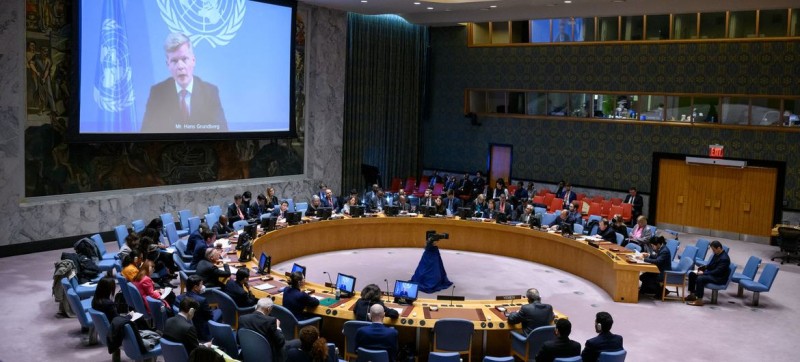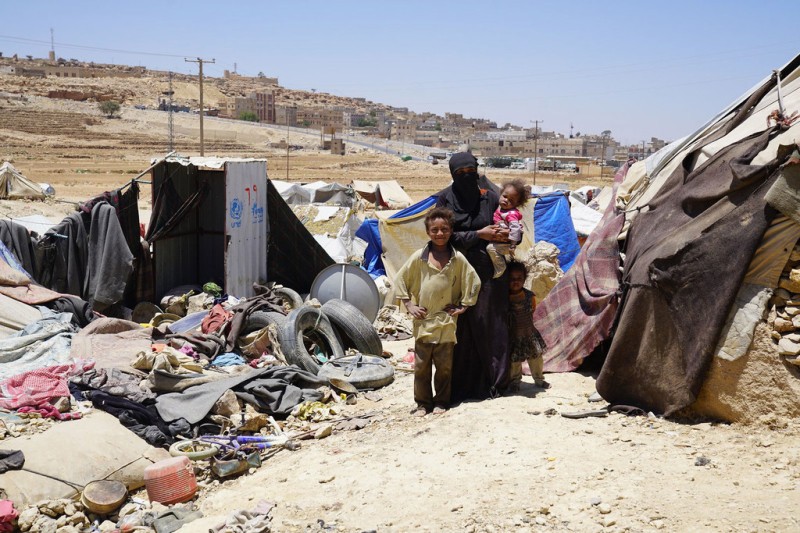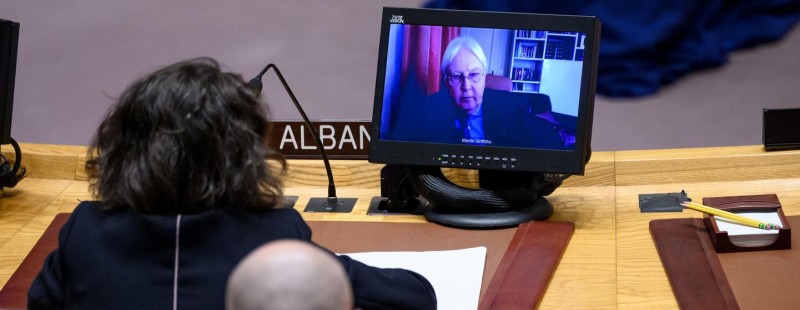
UN Photo/Loey Felipe Hans Grundberg (on screen), Special Envoy of the Secretary-General for Yemen, briefs the Security Council meeting on Yemen.
Special Envoy Hans Grundberg reported on his ongoing mediation efforts with the Government and Houthi rebels, also known as Ansar Allah, following their failure last October to extend a landmark truce that lasted six months.
Regional and international efforts towards ending their eight-year war have also intensified, pointing to “a potential step-change” in the trajectory of the conflict.
“Yemen needs an agreement that includes a shared vision for the way forward, in order to avoid a return to full-blown conflict. I therefore urge the parties to make the most of the space for dialogue provided by the absence of large-scale fighting,” he said.
No major escalation
The overall situation on the ground in Yemen has remained stable, with no major escalation or changes in the disposition of frontlines, Mr. Grundberg told ambassadors.
However, some limited military activity continues along frontlines, particularly in five governorates – Ma’rib, Taiz, Dali’, Hodeidah, and Lahj – as well as along the border with Saudi Arabia, which has resulted in civilian casualties.
Warning against the possibility of renewed violence, he urged the parties “to actively work to extend the longest period of relative quiet we have seen in the past eight years, which offers a much-needed reprieve for the Yemeni population.”
A holistic approach
Turning to his mediation efforts, the UN envoy said he has been in continued contact with the two sides and countries in the region.
Discussions have focused on options to secure agreement on military de-escalation, as well as measures to prevent further economic deterioration, and mitigating the conflict’s impact on civilians.
Mr. Grundberg cautioned against “short-term measures and a piecemeal approach that focuses on individual issues”.
Instead, he has been engaging around a more holistic vision and ensuring the parties move towards a more comprehensive settlement, which includes resumption of a political process as well as a nationwide ceasefire.

© UNOCHA In Yemen, people are dying of treatable ailments because basic medical services are no longer available. (file)
Regional support ‘crucial’
“We are currently seeing an intensification of regional and international diplomatic activity to resolve the conflict in Yemen, and I would like to reiterate my appreciation for the efforts of Saudi Arabia and Oman in this regard,” said Mr. Grundberg.
“While this support is crucial in both the negotiation and implementation phases of any agreement, I would also like to stress the importance of Yemeni ownership of the process. Many of the issues on the table, especially those related to sovereignty issues, can only be sustainably resolved through an inclusive, intra-Yemeni dialogue.”
Advice for negotiations
Although the situation “remains complex and fluid”, Mr. Grundberg said the dialogue efforts have allowed for a clearer definition of the parties’ position and the development of options for mutually acceptable solutions to outstanding issues.
He stressed that discussions on the short-term way forward must be framed in the context of a more comprehensive approach that delineates a clear pathway towards a sustainable political settlement.
“Some of the issues on the negotiation table cannot be viewed in isolation. There are sequencing challenges as well as concerns around guarantees for all sides, and these need to be addressed,” said the envoy.
He added that while working towards a shared vision for ending the conflict, it is also essential to break it down into concrete, actionable steps in order to avert potential challenges and delays in implementation.
“Ultimately any set of steps should be geared towards facilitating an inclusive Yemeni-led process under UN auspices for sustainably resolving the conflict,” he said.
‘Unnecessary’ aid impediments
This year, some 21.6 million Yemenis will need humanitarian assistance and protection services, UN relief chief Martin Griffiths told the Council.
He said “unnecessary and unhelpful access impediments” remain a major obstacle to aid delivery there, and are among the worst in the world.
“Last year, humanitarian partners, agencies, reported more than 3,300 access incidents. That’s the equivalent of almost 10 a day. And collectively, these incidents…affected the provision of assistance to more than five million people,” said Mr. Griffiths.

UN Photo/Loey Felipe Martin Griffiths (on screen), Under-Secretary-General for Humanitarian Affairs and Emergency Relief Coordinator, briefs the Security Council meeting on Yemen.
Restrictions affecting women
Bureaucratic barriers, such as restrictions on humanitarian movements, and delays in approving visas or work permits, were the most frequently reported constraints.
Humanitarians also have to cope with attempted interference, which Mr. Griffiths said is “prevalent at every stage in aid delivery”, and is also particularly severe in areas under Houthi control.
He expressed concern about the imposition of strict mahram requirements, again primarily in areas controlled by the Houthis, which prevent Yemeni women aid workers from travelling without a male guardian.
“They impede effective programme delivery by forcing delays or even suspensions of critical missions and programmes. And they are increasingly severing our access to Yemen’s most vulnerable people – women and girls,” said Mr. Griffiths.
Appeal for access
Humanitarian operations have also been hampered by security concerns. Last year, aid agencies reported almost 150 incidents of violence against their personnel, mainly in Government-controlled areas.
“Two UN staff remain detained in Sana’a after 14 months, and another five are still missing after being kidnapped in Abyan almost a year ago,” he added.
Mr. Griffiths appealed to the parties to facilitate safe, rapid and unimpeded humanitarian access, and to ensure aid workers and assets are protected, in line with international humanitarian law.

